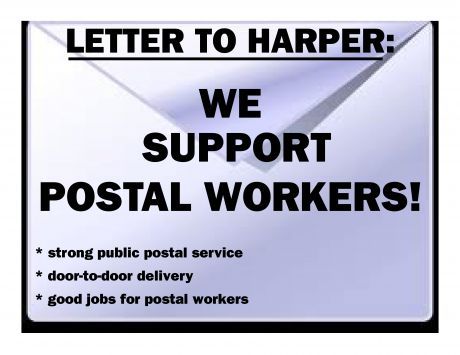Features
You are here
Postal workers: pensions, privatization and the public good

January 4, 2014
Scrooge-like Canada Post CEO, Deepak Chopra, announced the phase out of door-to-door mail delivery by 2015 just before the Christmas holidays. Then, attempting to quell the outrage this sparked, said it is a good idea because seniors will get more exercise going to the community mailbox. Facepalm.
The announcement of 8,000 job cuts and the end of home delivery is not a surprise given the Harper government’s ideological attacks on public services and public sector workers. But, there is a great deal of confusing information that is spinning the message.
First, the main message is that home delivery is obsolete in the age of the internet. Yet, Canada Post has recently massively invested in a modernization project, including vans for letter carriers so that they can deliver parcels to meet the rising online shopping demand. Second, the government has raised postal rates and is claiming Canada Post is a burden on taxpayers and we can’t afford it. But the reality is that Canada Post is self-sustaining and in sixteen out of the last seventeen years it has made millions in profits. That money has gone back into government coffers--representing a net gain to taxpayers.
Pension Shortfall
The issue that is sparking the current cutback is a pension shortfall that would require the government to kick in to the pension fund to maintain its viability.
The 2008 economic crisis put the squeeze on investments and the fund did not perform as predicted. Although the Harper government extended billions of dollars to Canadian banks to head off the kind of meltdowns that happened in the US and it continues to give generous tax breaks to corporations, they are not willing to bail out workers.
Similar to the deal offered to Air Canada this year, the Harper government is willing to allow Canada Post to spread out pension contribution over an extended period. But there are conditions. Just as Air Canada has hammered away at its workers to keep costs down, Canada Post must do the same. The job and service cuts are the result.
Privatization Boondoggle
The other puzzling question is why is Canada Post investing so heavily in modernizing an "obsolete" service? The answer is privatization. A brief look at what has been happening in the UK since the Royal Mail was privatized in the fall 2013 is enlightening.
Although the Royal Mail was valued at 10 billion pounds it was sold at the fire sale price of 3.3 billion pounds. The banks that advised the government on the sale were allotted thirteen million shares as the stock price was going through the roof. The share price went up 67 per cent in the two weeks following the sale. This was on top of seventeen million pounds in fees the banks got for advising on the sale.
The modernization of Canada Post at the same moment as it is being called obsolete opens the door to the opportunity to sell it to corporate interests at a bargain price.
Outrage, resistance and a militant history
In the polls, 58 per cent were outraged by the cuts announcement. Postal workers rallied at MP’s office across Canada and handed a 10,000 signature petition to Labour Minister Lisa Raitt’s constituency office in Milton, Ontario. An apt cartoon, showing the politicians congratulating themselves while seniors crawled to a mailbox summed up the sentiment of many.
It was postal workers who led a strike, initiated by francophone and anglophone workers in Montreal and Vancouver, that led to the unionization of all public sector workers in Canada. They unionized and established the Canadian Union of Postal Workers (CUPW) to end decades of poverty wages and poor working conditions.
In an historic 1981 strike, postal workers walked out for maternity leave and won. This victory led to maternity leave for all public sector employees.
Postal workers are organizing in response to this latest attack and with public sentiment on their side is the opportunity to once again, fight for good jobs and services.
Show your support for postal workers by putting a sign in your window and talking to your postie if you have home delivery. Sign and circulate the petition in your workplace, campus and neighbourhood. Pass resolutions in your union locals and join or start a support campaign in your area.
Section:










